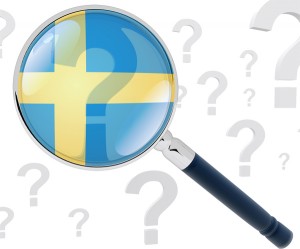 That’s ogooglebar! If you’ve had recent conversations with your Swedish friends, you may have heard this term. In fact, it’s become so commonly used in Sweden that the Swedish Language Council planned to officially add it to the Swedish language. The English translation basically means ungoogleable, something that you can’t find through the use of a search engine. With our ever increasing reliance on internet searches it’s a useful term, but it is also a term that Google wants to make sure is handled with appropriate care. That’s why Google’s trademark attorneys recently contacted the Language Council asking them to reference Google’s status as a registered trademark and to change the definition from all search engines to Google specifically. This was not a vanity move by Google, but rather a move to protect their trademark registration.
That’s ogooglebar! If you’ve had recent conversations with your Swedish friends, you may have heard this term. In fact, it’s become so commonly used in Sweden that the Swedish Language Council planned to officially add it to the Swedish language. The English translation basically means ungoogleable, something that you can’t find through the use of a search engine. With our ever increasing reliance on internet searches it’s a useful term, but it is also a term that Google wants to make sure is handled with appropriate care. That’s why Google’s trademark attorneys recently contacted the Language Council asking them to reference Google’s status as a registered trademark and to change the definition from all search engines to Google specifically. This was not a vanity move by Google, but rather a move to protect their trademark registration.
It’s good to be Google these days, but with the omnipresence of its search engine and other applications, the company needs to be careful that its trademark does not become genericized, or in other words, become generic. If people begin using the term google to mean the action of searching the internet regardless of whether they are using Google’s search engine or not, Google runs the risk of the term losing its unique source identifying nature and thereby forfeiting the rights associated with its trademark registration. Good trademark attorneys know to advise their clients on how to avoid having a brand name become the definition of the marketed goods so they do not lose their trademark rights.
One critical function of a trademark is that it serves to identify the source of the goods or services provided by the trademark owner. If the term google begins to refer to an internet search using any search engine, it becomes an everyday word and loses its trademark status. It no longer carries its source identifying characteristic signaling to the consumer that the term indicates the search is provided by Google. That is probably why Google insisted that the Swedish Language Council specify that the term refer only to the Google search engine and not all search engines broadly. The Swedish Language Council decided to drop the word all together rather than make the changes requested by Google. However, by preventing codification of a generic reference to the term google, Google’s trademark attorneys were successful in preventing erosion of Google brand trademark rights.
As unusual as it may sound, these are the types of things trademark attorneys have to monitor. Conducting a trademark search, filing a trademark application, and subsequently obtaining a trademark registration are just the beginning stages of securing trademark rights. Once a trademark registration is granted, the United States Patent and Trademark Office does not monitor trademarks for infringement or genericization. A good trademark attorney can help you with these tasks and properly protect and enforce your brand rights.
If you need assistance securing or enforcing a trademark registration, contact the knowledgeable trademark attorneys at Trademark Access for all your trademark needs.
Other Related Articles
ALS Withdraws Ice Bucket Challenge Trademark Application
Cisco Surprised by Trademark Lawsuit
How Does a Trademark Dispute Arise From the Word How
